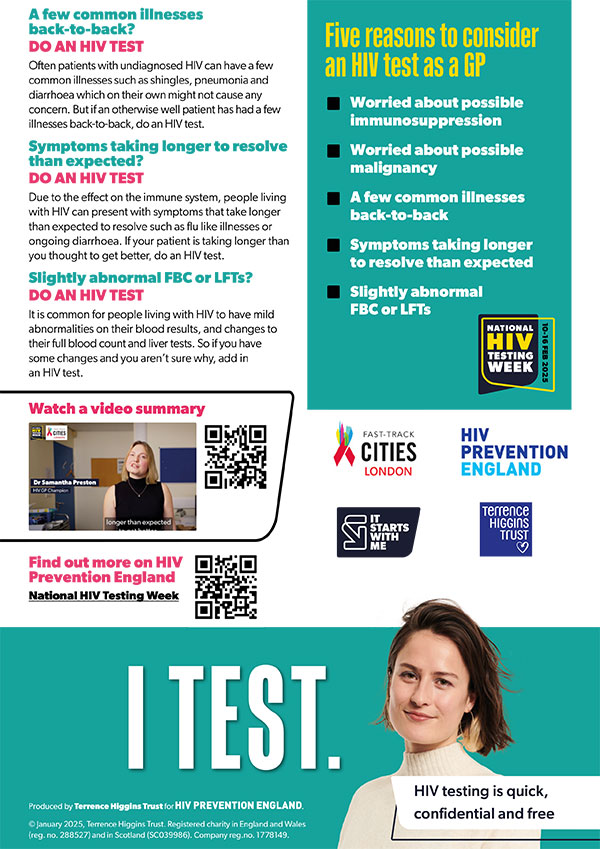Back to News
HIV Testing Week
Posted or Updated on 6 Feb 2025



National HIV Testing Week is taking place 10-16 February 2025, helping to promote regular testing in England.
This year is an important opportunity for us to get back on track to end new HIV cases by 2030 in England. We won’t be able to end new HIV transmissions without increasing testing and reaching people
who are not currently getting tested for HIV.
National HIV Testing Week is a great time to remind yourself when to test patients for HIV.
There are lots of reasons for clinicians to do an HIV test and knowing about indicator conditions can help you to think about HIV. This list can be extensive so we wanted to put together five key messages to get you thinking about doing HIV tests in your clinical practice.
Worried about possible immunosuppression?
DO AN HIV TEST
Often HIV infection is the great mimic and presents like lots of other conditions. If the patient has weight loss / sweats or other signs that make you worried there is something underlying going on, add in an HIV test to your investigations.
Worried about possible malignancy?
DO AN HIV TEST
People living with HIV can often present with systemic symptoms. HIV tests are now included in some RDC pathways and can be associated with a variety of malignancies, so if you are thinking of doing a 2WW, add in an HIV test.
A few common illnesses back-to-back?
DO AN HIV TEST
Often patients with undiagnosed HIV can have a few common illnesses such as shingles, pneumonia and
diarrhoea which on their own might not cause any concern. But if an otherwise well patient has had a few
illnesses back-to-back, do an HIV test.
Symptoms taking longer to resolve than expected?
DO AN HIV TEST
Due to the effect on the immune system, people living with HIV can present with symptoms that take longer than expected to resolve such as flu like illnesses or ongoing diarrhoea. If your patient is taking longer than you thought to get better, do an HIV test.
Slightly abnormal FBC or LFTs?
DO AN HIV TEST
It is common for people living with HIV to have mild abnormalities on their blood results, and changes to
their full blood count and liver tests. So if you have some changes and you aren’t sure why, add in an HIV test.
Five reasons to consider an HIV test as a GP
- Worried about possible immunosuppression
- Worried about possible malignancy
- A few common illnesses back-to-back
- Symptoms taking longer to resolve than expected
- Slightly abnormal FBC or LFTs